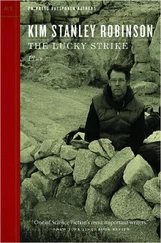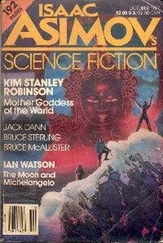As with all cliff climbs, topping out is a strange experience. After a month of vertical reality, the huge flatness seems all wrong—especially this snowy flatness that extends like a broad fan to each side. The snow ends at the broken edge of the cliff behind them, extends high up the gentle slope of the conical immensity before them. It is easy to believe they stand on the flank of the biggest volcano in the solar system.
“I guess the hard part is over,” Dougal says matter-of-factly.
“Just when I was getting in shape,” says Roger, and they both laugh.
A snowy plateau, studded with black rocks, and some big mesas. To the east, empty air: far below, the forests of Tharsis. To the northwest, a hill sloping up forever.
Marie arrives and dances a little jig on the boulder. Dougal hikes back to the wall and drops into the amphitheater again, to carry up another load. Not much left to bring; they are almost out of food. Eileen arrives, and Roger shakes her hand. She drops her pack and gives him a hug. They pull some food from the packs and eat a cold lunch while watching Hans, Arthur, and Stephan start up the bottom of the bowl. Dougal is already almost down to them.
When they all reach the top, in a little string led by Dougal, the celebrating really begins. They drop their packs, they hug, they shout, Arthur whirls in circles to try to see it all at once, until he makes himself dizzy. Roger cannot remember feeling exactly like this before.
“Our cache is a few kilometers south of here,” Eileen says after consulting her maps. “If we get there tonight we can break out the champagne.”
They hike over the snow in a line, trading the lead to break a path. It is a pleasure to walk over flat ground, and spirits are so light that they make good time. Late in the day—a full day’s sunshine, their first since before base camp—they reach their cache, a strange camp full of tarped-down, snowdrifted piles, marked by a lava causeway that ends a kilometer or so above the escarpment.
Among the new equipment is a big mushroom tent. They inflate it and climb in through the lock and up onto the tent floor for the night’s party. Suddenly they are inside a giant transparent mushroom, bouncing over the soft clear raised floor like children on a feather bed; the luxury is excessive, ludicrous, inebriating. Champagne corks pop and fly into the transparent dome of the tent roof, and in the warm air they quickly get drunk, and tell each other how marvelous the climb was, how much they enjoyed it—the discomfort, exhaustion, cold, misery, danger, and fear already dissipating in their minds, already turning into something else.
The next day Marie is not at all enthusiastic about the remainder of their climb. “It’s a walk up a bloody hill! And a long walk at that!”
“How else are you going to get down?” Eileen asks acerbically. “Jump?”
It’s true; the arrangement they have made forces them to climb the cone of the volcano. There is a railway that descends from the north rim of the caldera to Tharsis and civilization; it uses for a rampway one of the great lava spills that erase the escarpment to the north. But first they have to get to the railway, and climbing the cone is probably the fastest, and certainly the most interesting, way to do that.
“You could climb down the cliff alone,” Eileen adds sarcastically. “First solo descent . . .”
Marie, apparently feeling the effects of last night’s champagne, merely snarls and stalks off to snap herself into one of the cart harnesses. Their new collection of equipment fits into a wheeled cart, which they must pull up the slope. For convenience they are already wearing the space suits that they will depend on higher up; during this ascent they will climb right out of most of Mars’s new atmosphere. They look funny in their silvery green suits and clear helmets, Roger thinks; it reminds him of his days as a canyon guide, when such suits were necessary all over Mars. The common band of the helmet radios makes this a more social event than the cliff climb, as does the fact that all seven of them are together, four hauling the cart, three walking freely ahead or behind. From climb to hike: The first day is a bit anticlimactic.
On the snowy southern flank of the volcano, signs of life appear everywhere. Goraks circle them by day, on the lookout for a bit of refuse; at dusk ball owls dip around the tent like bats. On the ground Roger sees marmots on the boulders and volcanic knobs, and in the system of ravines cut into the plateau they find twisted stands of Hokkaido pine, chir pine, and noctis juniper. Arthur chases a pair of Dall sheep with their curved horns, and they see prints in the snow that look like bear tracks. “Yeti,” Dougal says. One mirror dusk they catch sight of a pack of snow wolves, strung out over the slope to the west. Stephan spends his spare time at the edges of the new ravines, sketching and peering through binoculars. “Come on, Roger,” he says. “Let me show you those otterines I saw yesterday.”
“Bunch of mutants,” Roger grumbles, mostly to give Stephan a hard time. But Eileen is watching him to see his response, and dubiously he nods. What can he say? He goes with Stephan to the ravine to look for wildlife. Eileen laughs at him, eyes only, affectionately.
Onward, up the great hill. It’s a six-percent grade, very regular, and smooth except for the ravines and the occasional small crater or lava knob. Below them, where the plateau breaks to become the cliff, the shield is marked by some sizable mesas—features, Hans says, of the stress that broke off the shield. Above them, the conical shape of the huge volcano is clearly visible; the endless hill they climb slopes away to each side equally, and far away and above they see the broad flat peak. They’ve got a long way to go. Wending between the ravines is easy, and the esthetic of the climb, its only point of technical interest, becomes how far they can hike every day. It’s 250 kilometers from the escarpment up to the crater rim; they try for twenty-five a day, and sometimes make thirty. It feels odd to be so warm; after the intense cold of the cliff climb, the space suits and the mushroom tent create a distinct disconnection from the surroundings.
Hiking as a group is also odd. The common band is a continuous conversation, that one can switch on or off at will. Even when not in a mood to talk, Roger finds it entertaining to listen. Hans talks about the areology of the volcano, and he and Stephan discuss the genetic engineering that makes the wildlife around them possible. Arthur points out features that the others might take for granted. Marie complains of boredom. Eileen and Roger laugh and add a comment once in a while. Even Dougal clicks into the band around midafternoon, and displays a quick wit, spurring Arthur toward one amazing discovery after another. “Look at that, Arthur, it’s a yeti.”
“What! You’re kidding! Where?”
“Over there, behind that rock.”
Behind the rock is Stephan, relieving himself. “Don’t come over here!”
“You liar,” Arthur says.
“It must have slipped off. I think a Weddell fox was chasing it.”
“You’re kidding!”
“Yes.”
Eileen: “Let’s switch to a private band. I can’t hear you over all the rest.”
Roger: “Okay. Band 33.”
“Why that one?”
“Ah—” It was a long time ago, but this is the kind of weird fact his memory will pop up with. “It may be our private band from our first hike together.”
She laughs. They spend the afternoon behind the others, talking.
One morning Roger wakes early, just after mirror dawn. The dull horizontal rays of the quartet of parhelia light their tent. Roger turns his head, looks past his pillow, through the tent’s clear floor. Thin soil over rock, a couple of meters below. He sits up; the floor gives a little, like a gel bed. He walks over the soft plastic slowly so that he will not bounce any of the others, who are sleeping out where the cap of the roof meets the gills of the floor. The tent really does resemble a big clear mushroom; Roger descends clear steps in the side of the stalk to get to the lavatory, located down in what would be the mushroom’s volva. Emerging he finds a sleepy Eileen sponging down in the little bath next to the air compressor and regulator. “Good morning,” she says. “Here, will you get my back?”
Читать дальше
Конец ознакомительного отрывка
Купить книгу












